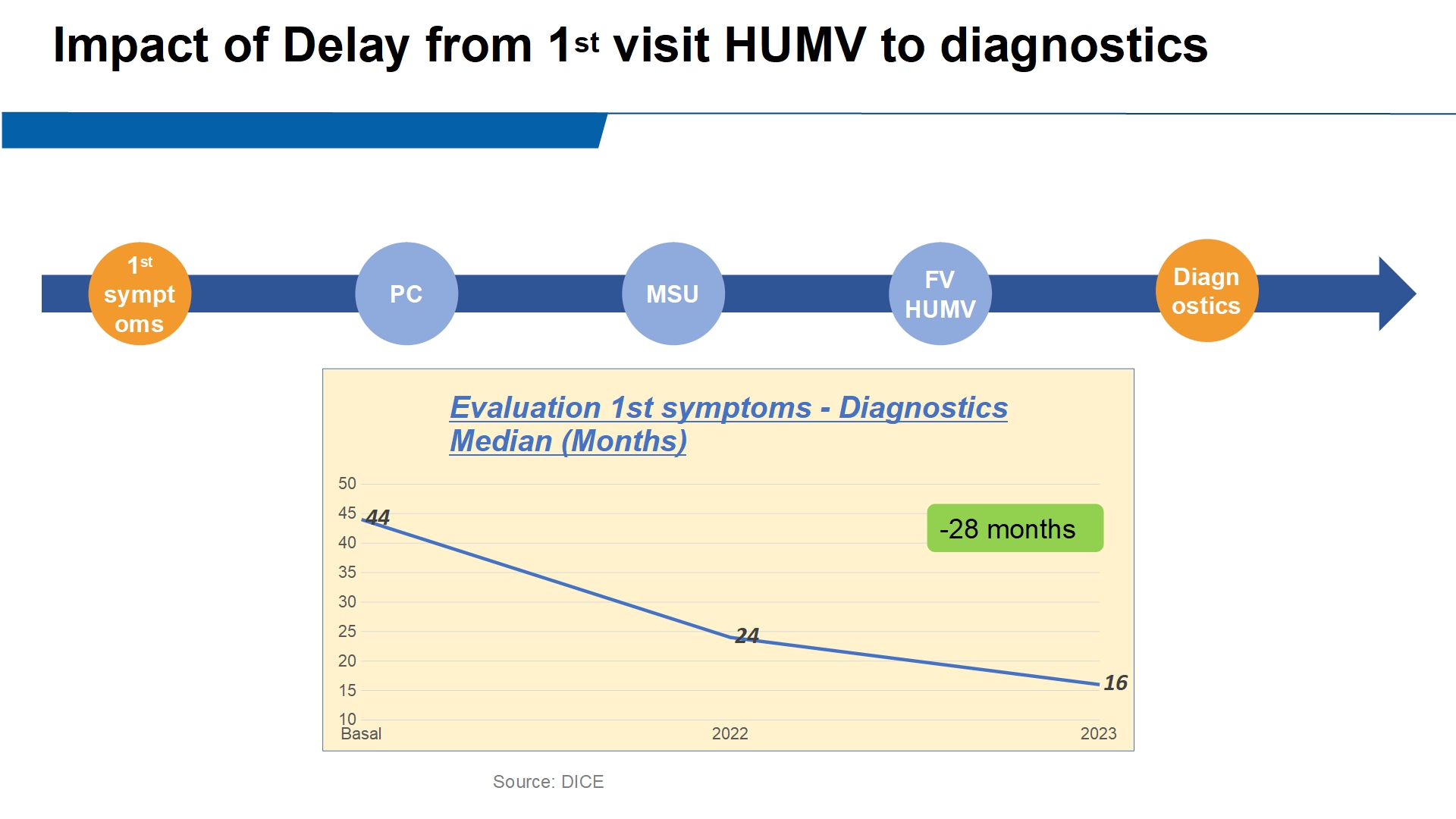Session Information
Date: Saturday, November 16, 2024
Title: SpA Including PsA – Diagnosis, Manifestations, & Outcomes Poster I
Session Type: Poster Session A
Session Time: 10:30AM-12:30PM
Background/Purpose: Spondyloarthritis (SpA) constitutes a diverse set of inflammatory rheumatic diseases with a prevalence of 1.9% in the general population. Diagnostic delay, identified as a determining factor in the worsening of the disease, has been pointed out in the ATLAS 2017 study with an average of almost 9 years, significantly affecting the quality of life of patients1,2,3. This study addresses early detection as a crucial challenge for health professionals, seeking to improve the functional situation of patients, reduce comorbidities and prevent loss of quality of life.
The EspAnde project focuses on optimizing the coordination between Primary Care (PC) and Rheumatology, through the Musculoskeletal Unit (MSU), with the purpose of identifying, implementing and evaluating improvements in the care pathway for patients with spondyloarthritis. The objective is to promote early referral, reducing diagnosis and treatment times.
Methods: A Working Group composed of PC physicians and rheumatologists from the MSU was founded. The current situation of the care process for patients with spondyloarthritis in the Health Area was analyzed, developing solutions such as an early referral algorithm and a screening test (PURE 4), both integrated into the PC Cantabria computer program. The MSU provided training to PC professionals for correct implementation. Impact monitoring and measurement was carried out, including analysis of results.
Results: In 2021, the diagnostic delay in patients with SpA in the Santander area was 44 months. Two years after the implementation of the project, a significant reduction was achieved, reaching an average diagnosis time of 16 months in 2023, representing a median decrease of 28 months (Figure 1). In 2023, upon arrival at the Rheumatology department, 71% of patients were able to confirm or rule out the diagnosis on the first visit, compared to 43% at baseline, indicating a positive impact of the project on the efficiency of early diagnosis.
Conclusion: The EspAnde project has proven to be highly effective by significantly reducing the diagnostic delay of spondyloarthritis in the Santander area, going from 44 months in 2021 to 16 months in 2023. The collaboration between Primary Care and Rheumatology, supported by algorithms and screening tests, has improved diagnostic certainty upon reaching the Rheumatology service, reaching 71% in 2023. This approach has also strengthened care coordination and highlights the importance of the sustainability and continuity of these practices. Furthermore, early detection is expected to have a positive impact on patients’ quality of life. These lessons learned and encouraging results suggest potential for replication and adaptation of these strategies in other healthcare settings.
To cite this abstract in AMA style:
Sánchez-Martín J, Martinez-Dubois C, Rueda Gotor J, Pinedo-Lopez G, Perez-Martin A, Gonzalez-Santamaria R, Atienza-Mateo B, Calvo-Rio V, Gonzalez-Mazon I, Palmou Fontana N, Peiro-Callizo E, Prieto-Peña D, Sanchez Bilbao L, Lopez-Gutierrez F, Blanco-Alonso R. EspANDE Project: Improvement of Primary Care-Rheumatology Coordination in Spondyloarthritis in a Health Area in Northern Spain [abstract]. Arthritis Rheumatol. 2024; 76 (suppl 9). https://acrabstracts.org/abstract/espande-project-improvement-of-primary-care-rheumatology-coordination-in-spondyloarthritis-in-a-health-area-in-northern-spain/. Accessed .« Back to ACR Convergence 2024
ACR Meeting Abstracts - https://acrabstracts.org/abstract/espande-project-improvement-of-primary-care-rheumatology-coordination-in-spondyloarthritis-in-a-health-area-in-northern-spain/

